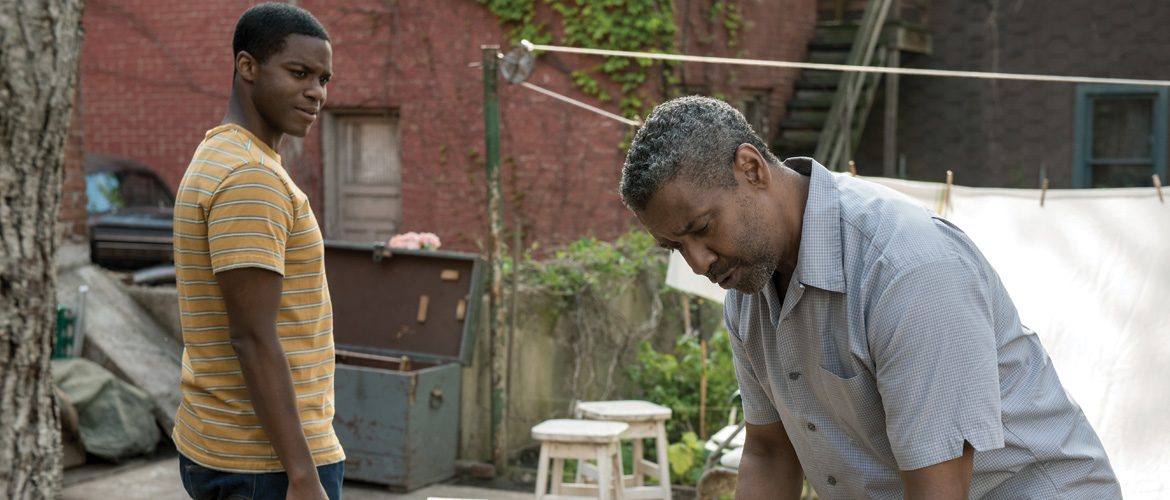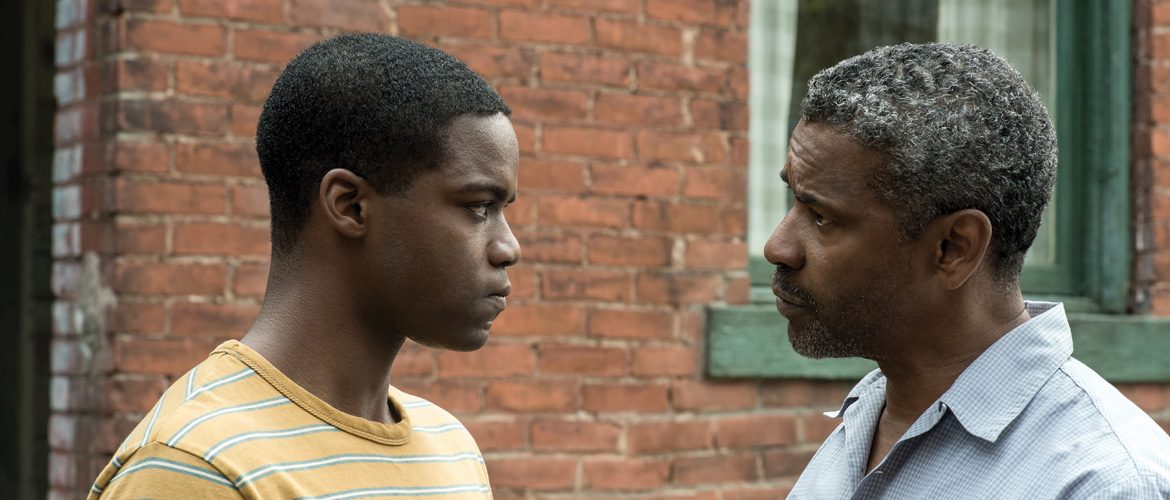By Diane Howard, Ph.D.
The movie, “Fences” is a based on August Wilson’s play by the same name. Wilson was an American playwright whose work included a series of ten plays, “The Pittsburgh Cycle,” for which he received two Pulitzer Prizes for Drama.
The movie is set in the 1950s, and is the sixth in Wilson’s ten-part series. As is true of all the plays in the cycle, “Fences” explores the developing African-American experience and examines race relations, among other of his universal themes—typically dealing basically and universally with discovering one’s identity.
The movie (like the play) has a great deal of dialogue, but the dialogue has an iambic blues rhythm full of rich literary devices. Although the movie has cinematographic elements and more movement than the play, it looks very much like a filmed version of the play, albeit a masterful one. Because the dialogue comes from a series of Pulitzer Prize plays, it is layered with carefully-constructed artistic—and especially musical—elements.
The movie is a tragic but insightful, compassionate look at inter-generational patterns in African American families, especially of the “Great Migration” from the South to the Northern cities. There are universal themes and warnings with some redemptive hope.
Denzel Washington directs the movie and plays the lead role of Troy Maxson. Viola Davis plays the supporting role of his wife. Both performed these roles on Broadway to great acclaim. They have also won many awards for the movie. Denzel has won the Screen Actors Guild Award for Outstanding Performance by a Male Actor in a Leading Role and the NAACP Image Award for Outstanding Actor in a Motion Picture. Viola Davis has won the following: Academy Award for Best Actress in a Supporting Role, Golden Globe Award for Best Supporting Actress – Motion Picture, Critics’ Choice Movie Award for Best Supporting Actress, Screen Actors Guild Award for Outstanding Performance by a Female Actor in a Supporting Role, NAACP Image Award for Outstanding Supporting Actress in a Motion Picture, and the BAFTA Award for Best Actress in a Supporting Role.
There are key, recurring, developing elements in the story of “Fences.” It begins on a recurring Friday event, which was Tory’s and his friend, Bono’s payday. Troy’s and Rose’s son, Cory, has been recruited by a college football team. Troy has been in the Negro Leagues but never got a chance to play in the Major Leagues, because he got too old to play, even as the Major Leagues began accepting black players. Troy goes into a long epic story about his struggle in July of 1943 with Death. This struggle is throughout the story. Rose reminds Troy about the fence she’s asked him to finish building. The fence is a metaphor with multiple meanings.
As Cory and Troy work on the fence, Cory tells Troy that he has given up his job at the local grocery store for the football season. Cory begs Troy to let him play because a coach from North Carolina is coming to Pittsburgh to watch him. Troy refuses and insists that Cory get his job back.
Troy gets a promotion as the first African American garbage truck driver in the city. Bono and Troy remember their difficult fathers, their rough childhood experiences, leaving home in the South, and moving north. Cory comes home furious when he learns that Troy told his football coach that Cory may not play on the team. Troy warns Cory that his insubordination is “strike one.”
Troy bails out his brother Gabriel from jail. Gabe is a veteran who was injured in the war. Bono and Troy continue to work on the fence. Bono explains to Troy and Cory that Rose wants the fence because she loves her family and wants to keep them close. Troy tells Bono about his self-esteem building relationship with a woman named Alberta. Bono bets Troy that if he finishes building the fence for Rose, Bono will buy his wife, Lucille, the refrigerator he has promised her. Troy tells Rose about a hearing in three weeks about recommitting Gabriel to an asylum. Troy also tells Rose about Alberta, which turns into a physical argument. Troy grabs Rose’s arm and Cory grabs Troy from behind. They fight but Troy wins. Troy calls “strike two” on Cory.
Six months later, Troy says he is going over to the hospital to see Alberta, who went into labor early with his child. Rose tells Troy that Gabriel has been taken away to the asylum because of Troy. Alberta has had a baby girl but dies during childbirth. Troy challenges Death to come and get him after he builds the fence. Troy brings home his baby, Raynell. Rose takes in Raynell as her own child, but she refuses to serve Troy as a wife.
On Troy’s payday, Bono shows up. Troy and Bono acknowledge how each man made good on his bet about the fence and the refrigerator. Troy demands that Cory leave the house and provide for himself. Cory challenges Troy about his failings with Rose. Cory points out that the house and property, from which Troy is throwing Cory out, belong to Gabriel because Gabe’s government checks paid for most of the mortgage payments. Troy attacks Cory physically. Troy kicks Cory out of the house and Cory leaves. This is strike three. Troy swings the baseball bat in the air, taunting Death again.
Eight years later, Raynell plays in her newly planted garden, which is another recurring metaphor. Troy has died from a heart attack. Cory returns home from the Marines to attend Troy’s funeral but then he refuses to attend. Rose tells Cory that not attending Troy’s funeral does not make Cory a man. Raynell and Cory sing one of Troy’s father’s blues songs. Gabriel shows up, released or escaped from the mental hospital. Gabe blows his trumpet but no sound initially comes out. He tries again but the trumpet will not play. Disappointed and hurt, Gabriel makes a cry and the Heavens open wide. He says, “That’s the way that goes.”
I conducted an exclusive interview with Jovan Adepo, who plays Cory, the teenage son of Troy and Rose . The character, Cory is a senior in high school, who gets good grades and is a talented football player. Cory is a respectful son and a compassionate nephew to his disabled Uncle Gabriel. In general, he is a giving and enthusiastic person. He is an ambitious young man with talent and determination to fulfill his dreams.
DH: Tell us about your journey with performing.
JA: I had done plays in school and church. I wanted to be a writer and took writing and acting workshops.
DH: How did you get into film work?
JA: I performed in commercials and for television. “Fences” was my first feature film.
DH: What did you learn from working with Denzel as an actor and as a director?
JA: I had a unique front row seat to watch his patience, confidence, and choices.
DH: What did you learn from working with Viola?
JA: I learned the following: to be patient, to enjoy the process, to be in the moments, to breathe, to take the journey moment by moment even with each take.
DH: What did you learn about August Wilson’s work?
JA: I learned from Stephen Henderson, who played Bono on Broadway and in the movie, about the influences of jazz, the blues, and what he called the Blues Pentameter in August Wilson’s work.
DH: What is your vision for your future?
JA: I want to play interesting characters and choices, as I saw Denzel, Viola, and the cast do.
Themes, many of which are universal, in “Fences” include the following: coming of age with a recurring cycle of damaged manhood and difficult fathers; interpreting the past and planning for the future; and coping methods that include pragmatism, illusion, hope and more.
August Wilson uses the rhythm, language, and attitude of the blues in his plays, characters, and dialogue, and “Fences” is structured like the blues. It happens in one place as in one key of music; the characters each have their own rhythm and melody; the characters repeat phrases, or pass phrases around, like a blues band with a line of melody. Similar to the roles of repeated lyrics and melody in blues songs, Wilson’s characters display change in their lives and attitudes within repeating scenarios. For example, Troy’s payday, is the recurring setting of three scenes. However, the audience observes the change that occurs in those common settings. Wilson repeats events and language with what he calls a “blues aesthetic.”
Troy sings two blues songs: “Please Mr. Engineer (Let a Man Ride the Line)” and “Hear it Ring! Hear it Ring!” Rose sings “Jesus be a Fence all Around me Every Day.” Troy’s song has been passed on to him by his father and in the last scene of the play, Cory and Raynell sing the song together after Troy’s death. The blues in “Fences” connects generations and helps keep family roots and history alive.
During the Harlem Renaissance, when African American artists, writers, and poets flourished in the first half of the 20th century, as well as during slavery, trains were common literary devices in African American literature and music. A character that rode a train or talked of trains, or even went to a train station represented change. In “Fences,” Troy sings the blues song about riding the train. With this song, he cries out to his wife, Rose, to take him back. With baby in hand, Troy is asking Rose to give him a free ride of forgiveness. The train song also reflects when Troy and many other African Americans wandered North during the Great Migration with “I ain’t got no ticket, please let me ride the blinds.” Troy sings the song to his newborn daughter and thereby passes on the important story of her past while linking it to present.
Denzel Washington has revealed that the estate of August Wilson has asked him to shepherd Wilson’s nine films. Washington has said that he would produce adaptations of all 10 plays in August Wilson’s cycle about African-American life in the 20th century for HBO.
“I’ve been given the opportunity by the August Wilson estate—he did 10 plays—I’m directing, producing and acting in one, and I’m executive producing the other nine,” said Washington. “I made a deal with HBO. We’re going to do one a year for the next nine years.”
Fences is rated PG-13. It is a tragedy with some redemptive elements that is appropriate for adults, due to content and language. The movie has no F words; but Troy, the tragic figure which Denzel Washington plays, uses the N word throughout. Rose, the character whom Viola Davis plays, is a long-suffering Christian character who is loving and supportive to all in her family. She is also a tragic but a redemptive character. The tragic genre serves as a mirror and warning of what the audience should avoid. The movie ends with good found even in difficulties and tragedies, as well as with renewed hope.“Fences” is still in theaters but is due for Blu-ray, DVD, and On Demand release March 14.




